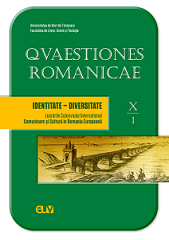Du druide gaulois au consul romain: convergence et association d’origines variées dans la construction de l’identité nationale française à la Renaissance
From the Gallic Druid to the Roman Consul: Convergence and Association of Various Origins in the Construction of French National Identity during the Renaissance
Author(s): Hannelore PierreSubject(s): Language studies, Political history, Social history, 16th Century, Identity of Collectives
Published by: Universitatea de Vest din Timişoara
Keywords: Gaul; Ausonius; Romanness; Renaissance; Gallo-Roman; Bordeaux; Elie Vinet;
Summary/Abstract: The 4th century was witness of the apparition in various ways of the presence of Gallics in the western Roman Empire, in particular through some usurpers emperors from Gallic origin. Nevertheless, it was not the only way of the recognition of a Celtic characteristic: Gallo-Roman poet Ausonius, in the 4th century AD, appears as the example of an intellectual from Gallic upper classes who reached to a whole integration into the Roman conquering world, since he taught in Bordeaux Latin language in which he was thought of as a virtuoso and because he reached Consulate in 379. Real or only claimed, the druidic origin of some professors of Bordeaux, obvious in the Commemoratio Professorum Burdigalensis written by Ausonius, says a lot about their will of pretending to be descendants of an ancestral and local particularity original. French Humanists of the 16th century remembered about that fact and tried to explain their own Gallic and Roman roots, which modeled not only their language but also their thought, their customs and their political system. How did Ausonius manage to unite these two worlds which made his identity? How much did integration into Romanness take place to the detriment of native and local components? We will try to bring some answers to this questioning through reading and analysing extracts from ausonian corpus and by referring to the commentaries of the 16th century’s Humanists, especially from Bordeaux.
Journal: Quaestiones Romanicae
- Issue Year: X/2023
- Issue No: 1
- Page Range: 180-197
- Page Count: 18
- Language: French

